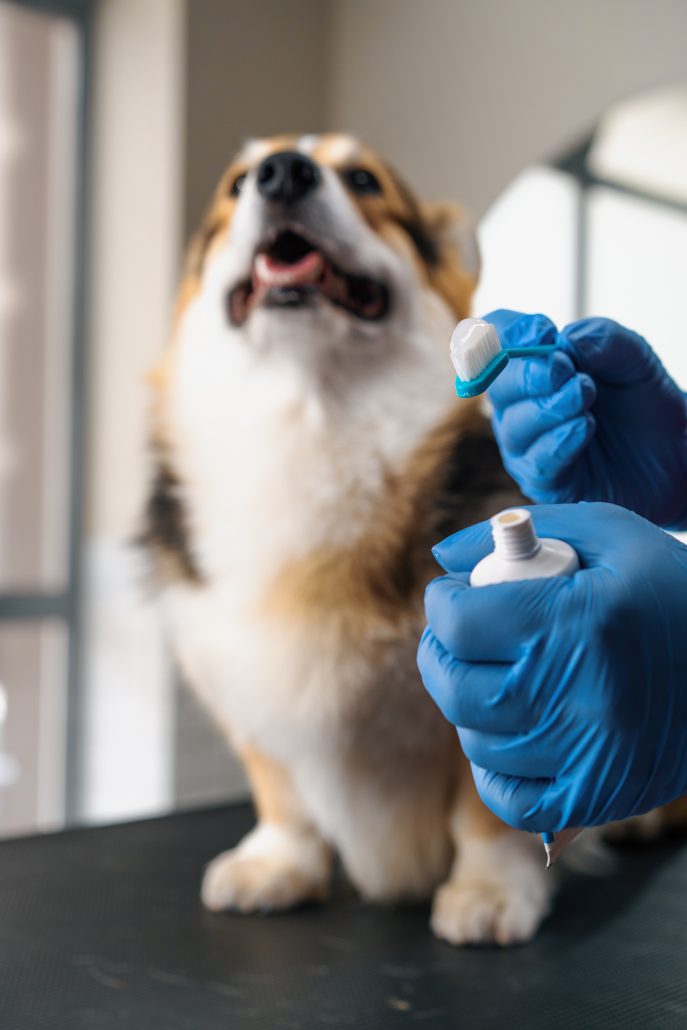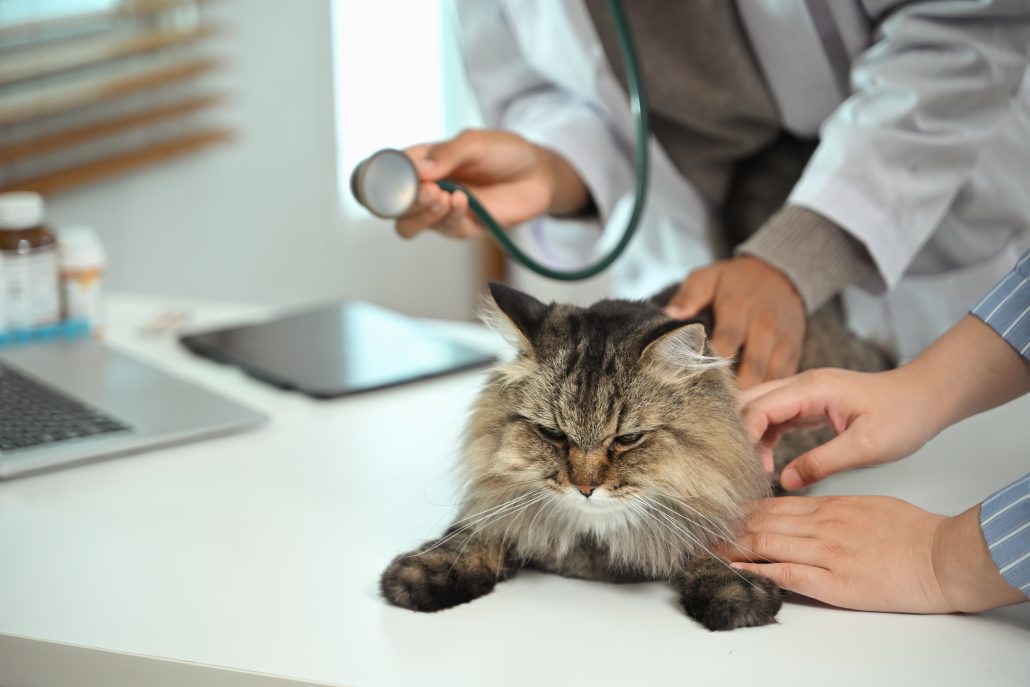
Many of us know that familiar worry when something seems off with our furry friends. The truth is, our pets are masters at hiding signs of illness or discomfort. Even when they appear perfectly healthy, subtle changes could be developing that only trained veterinary eyes can spot.
Regular check-ups are your pet’s shield against potential health issues. They are the chance to catch small problems before they become serious concerns. From early signs of dental disease to the first hints of arthritis, these routine checks help ensure your beloved companion stays happy and healthy ate every stage of their life.
As we approach the end of the year, it’s the perfect time to schedule their annual check-up, so they can walk into the new year happy and healthy! We’ll walk you through everything you need to know about annual pet check-ups and how they contribute to a longer, healthier life for your companion.
My Pet Is Healthy, Do They Really Need A Check-up?
It’s natural to feel that if your pet seems happy and healthy, they don’t need a check-up. After all, they’re running around, eating well, and acting like their usual selves—so why make that extra trip to the vet? But, it’s one of the best decisions you can make for your pet’s long-term health.
Unfortunately, our pets cant speak, so they can’t tell us when they’re in pain or not feeling well. While this instinct served them well in nature, it means that they might be silently suffering without showing obvious signs of trouble.
Here’s why these check-ups matter:
- They catch potential health issues before they become serious problems
- We can track important changes in vital signs over time
- Prevention costs far less than treating advanced conditions
- Our vets can spot subtle behavioural changes that might signal health issues
What Happens During a Check-Up?
We know that trips to the vet can sometimes feel a little daunting. Understanding what happens during a check-up can help ease any nerves—both yours and your pet’s. Here’s a breakdown of what you can expect during a typical veterinary visit:
- A detailed review of your pet’s medical history and lifestyle
- Essential measurements like weight and temperature
- Careful listening to heart and lung sounds
- Eye and ear inspection for infections or abnormalities
- Complete dental health check
- Coat and skin examination
- Abdominal palpation
- Muscle and joint evaluation
How Often Is a Check-Up Really Needed?
Our pets’ healthcare needs change as they age. While an annual checkup works well for adult pets in their prime years different life stages call for different approaches:
- Puppies and Kittens: Monthly visits until about 16 weeks of age
- Adult Pets (1-7 years): Annual check-ups
- Senior Pets (7+ years): Twice-yearly examinations
For our senior pets these regular checks can make a big difference. Their bodies change more rapidly, making them more susceptible to various health conditions., so extra catch-ups help catch problems early and keep them comfortable and active.
It is also important to consider the current health of your companion. If they are managing a chronic condition or recovering from an illness or surgery, more frequent visits may be necessary. These regular checks allow your vet to monitor their progress, adjust treatments, and ensure they’re on the right path to recovery or maintaining a good quality of life.

Catching Health Issues Early With Preventive Care
Preventive care is your pet’s first line of defence against serious health issues, offering the opportunity to address concerns before they become more severe—or even life-threatening.
Protection Through Vaccinations
Vaccinations are one of the most important forms of preventive care for your pet, protecting them against life-threatening diseases like parvovirus, distemper, and other contagious illnesses that can cause serious health complications. Vaccinations work by stimulating your pet’s immune system to produce protective antibodies, preparing their body to fight off infections if they are ever exposed.
Keeping your pet up to date on vaccinations not only protects their health but also contributes to the overall safety of other animals and even you and those around you! Your veterinarian will recommend a tailored vaccination schedule based on your pet’s age, lifestyle, and risk factors. Puppies and kittens, for example, require a series of vaccinations in their first few months of life while adult pets need regular boosters to maintain their protection.
Spotting Chronic Conditions Early
Routine screenings offer the best chance of spotting chronic conditions before visible symptoms appear. Some conditions, like arthritis, heart disease, and kidney disease, can develop quietly, without obvious signs at first. But, by staying on top of check-ups, we can catch these issues early and give our pets the best chance for successful treatment and recovery.
Silent Signs Our Pets Can’t Share
- Unusual patterns in drinking or bathroom habits: If your pet suddenly drinks a lot more (or less) water or has changes in their bathroom habits, it could signal issues with kidney function, diabetes, or urinary tract infections.
- Unexplained drops in weight: Losing weight without a change in diet or exercise could point to metabolic or digestive issues, or even a more serious condition like cancer.
- Poor appetite lasting beyond two days: If your pet isn’t eating or seems disinterested in food for more than a day or two, it might be a sign of dental problems, an infection, or something affecting their organs.
- Changes in how their coat looks or feels: If your pet’s fur is looking dull, feeling dry, or thinning out, it could mean they’re dealing with allergies, skin conditions, or even hormonal imbalances.
- Less interest in favourite activities: If your pet suddenly seems less interested in their usual activities—like playing with toys or going for walks—it might be a sign of discomfort or pain

Creating Your Pet's Perfect Health Plan
Every pet is unique, and so are their health needs. Regular check-ups help your vet get to know your pet, ensuring they’re aware of any breed-specific health concerns, as well as any age-related changes that may be a risk or concern.
Different breeds come with their own set of health challenges. For example, large breeds like German Shepherds are more likely to develop hip dysplasia, while smaller, brachycephalic (flat-faced) breeds like Pugs and Bulldogs face breathing difficulties and are 20 times more likely to develop painful eye ulcers compared to other breeds.
By understanding these needs, your vet can create a tailored health plan that offers the best care for your furry friend.
Adapting For Age-Appropriate Care
Healthcare needs change as your pet ages. The playful energy of a kitten or puppy gradually gives way to the calmer rhythms of adult life, and eventually, to the gentler needs of a senior pet.
For young pets, regular vaccinations, socialisation, and foundational care are key to ensuring they grow up strong and confident. As they enter their adult years, maintaining a healthy weight, providing dental care, and monitoring for any early signs of age-related issues, like arthritis, become increasingly important.
And, when your pet reaches their senior years, their needs shift again. They may require more frequent check-ups to monitor conditions like heart disease, kidney function, and arthritis. Older pets will also benefit from adjustments to their diet, exercise routines, and pain management strategies to help them stay comfortable and active in their golden years.

Oral Care For Healthy Teeth
Just like vaccinations and regular check-ups, taking care of your pet’s oral health is a crucial part of their overall well-being. Poor dental hygiene can lead to more than just some bad breath and dirty teeth. If their teeth are not cared for, it can result in some serious health problems that affect your pet’s entire body. When bacteria builds up in your pet’s mouth, it can enter the bloodstream and potentially damage vital organs like the heart, liver, and kidneys.
Regular dental check-ups can help:
- Prevent painful tooth and gum diseases
- Reduce risk of systemic infections
- Maintain proper eating habits
- Avoid procedures that can get pricey
- Ensure fresh breath and comfort
Signs of Dental Issues to Watch For
Dental issues can often sneak up on our pets and can progress quite quickly if not caught early. Between check-ups, you play a crucial role as your pet’s dental detective. Watch for these tell-tale signs that might signal problems:
- Bad breath (that’s worse than usual!)
- Unusual drooling or wet spots on bedding
- Dropping food or struggling while eating
- Pawing at the mouth
- Yellow or brown teeth
- Red, puffy, or bleeding gums
- Unexpected weight loss or food avoidance

Nutrition and Weight Management
Many pet owners don’t mind when their pets carry a little extra weight, thinking it’s just a sign of a happy, well-fed pet. The truth is, while those extra cuddly pounds might seem harmless, they can significantly affect your pet’s quality of life and shorten their lifespan. Some studies show that 61% of cats and 59% of dogs are estimated to be overweight or obese!
Overweight pets are at a higher risk for developing conditions like joint problems, heart disease, diabetes, and even certain cancers. However, with annual check-ups, your veterinarian can help create a customised nutrition plan that matches your pet’s unique needs as well as monitor their progress and adjust the pan as their needs change. They consider your pet’s age, breed, weight, activity level, and health concerns to ensure they are getting the right balance of nutrients and calories.
Parasite Prevention and Control
Parasites are annoying, but they can also create ongoing health risks and can cause pain, discomfort, and diseases if not caught, treated and managed as soon as possible. Did you know that as many as 50% of cats test positive for at least one parasite? The most common parasites affecting our pets are:
- External Parasites: Fleas and ticks can cause skin irritation and transmit serious diseases
- Internal Parasites: Hookworms, roundworms, and tapeworms can lead to malnutrition and gut disease
During your pet’s annual check-up, your veterinarian can recommend a detailed parasite prevention strategy tailored to your pet’s needs. Depending on their risk factors and lifestyle, treatments may include:
- Tablets: Oral medications that target both external and internal parasites.
- Topical Spot-on Treatments: Easy-to-apply treatments that prevent fleas and ticks.
- Annual Injections: Long-lasting injections that offer year-round protection.

Preparing for Your Pet’s Next Check-Up
Taking your pet to the vet can sometimes feel like a big event, but with a little preparation, you can make the experience smoother for everyone involved.
What to Bring and How to Get Ready
- Gather Your Pet’s Medical History: Before your appointment, it’s helpful to gather any relevant medical history about your pet. This includes vaccinations, past illnesses, treatments, and surgeries. If your pet has had any changes in their health or behaviour, make a note of those too. This way, your vet can have a full picture of your pet’s health, which helps in making any necessary decisions.
- Make a List of Questions: Do you have questions about your pet’s diet, exercise, or any health concerns? It’s easy to forget what you want to ask once you’re at the vet, so take a moment to jot down any questions or concerns you may have. Y
- Prepare for a Weight Check: It’s a good idea to assess their weight before the appointment. Keep track of any weight fluctuations you’ve noticed, as this information can be helpful for your vet. If your pet is overweight or underweight, they may recommend a nutrition or exercise plan.
- Bring Your Pet’s Current Medications: If your pet is on any medications or supplements, be sure to bring them along. This will help your vet review their current treatment plan and ensure everything is in order. They might also suggest changes based on your pet’s age, health status, or any changes in their condition.
- Stay Calm and Positive: Lastly, stay calm and positive! Pets can pick up on our emotions, so maintaining a relaxed attitude will help keep them calm as well. Offering praise, a treat, or some extra attention after the check-up can also help make the experience more positive for your pet.
Reducing Stress for Nervous Pets
We’ve all been there – just the idea of going to the vet can have your pet running and hiding!
- Start getting ready at home: Let your pet get used to their carrier by leaving it open in a familiar space a few days before the visit. Taking your dog for a walk before heading to the vet helps burn off extra energy.
- Stick to Your Normal Routine: Try to keep your pet’s routine as normal as possible on the day of the appointment. This includes feeding them at their usual time and doing things you’d normally do before heading out. Sticking to a routine can help ease their nerves.
- Talk to the Clinic About Your Pet’s Anxiety: If your pet tends to get anxious at the vet, let the clinic know ahead of time. Many clinics now offer “fear-free” options that are designed to minimize stress for anxious pets, such as quieter rooms, special handling techniques, and a calm approach.
- At-Home Check with a Mobile Vet: If your pet’s anxiety is particularly severe or it is simply to difficult to get you pet to an in-clinic checkup, consider a mobile vet like House Call Vet. With this option, the vet comes to you, allowing your pet to receive care in the comfort of their own home. This can be a great alternative for pets who find trips to the clinic especially stressful, offering a more relaxed and familiar environment.

The Power of Annual Pet Check-Ups
Investing in preventive care often saves both heartache and money down the road. These regular visits might seem unnecessary when your pet appears healthy, but they’re far more cost-effective than treating advanced conditions. By staying proactive with your pet’s health, you can catch potential issues early, ensuring they lead a longer, happier life by your side!
If you’re ready to take the next step in your pet’s care, consider booking a check-up with The House Call Vet. Whether it’s an at-home visit or visiting our friendly clinics in Kenmore and Sunnybank, we make your pet’s health our priority. Get in touch today to schedule an appointment and give your furry friend the care they deserve!

